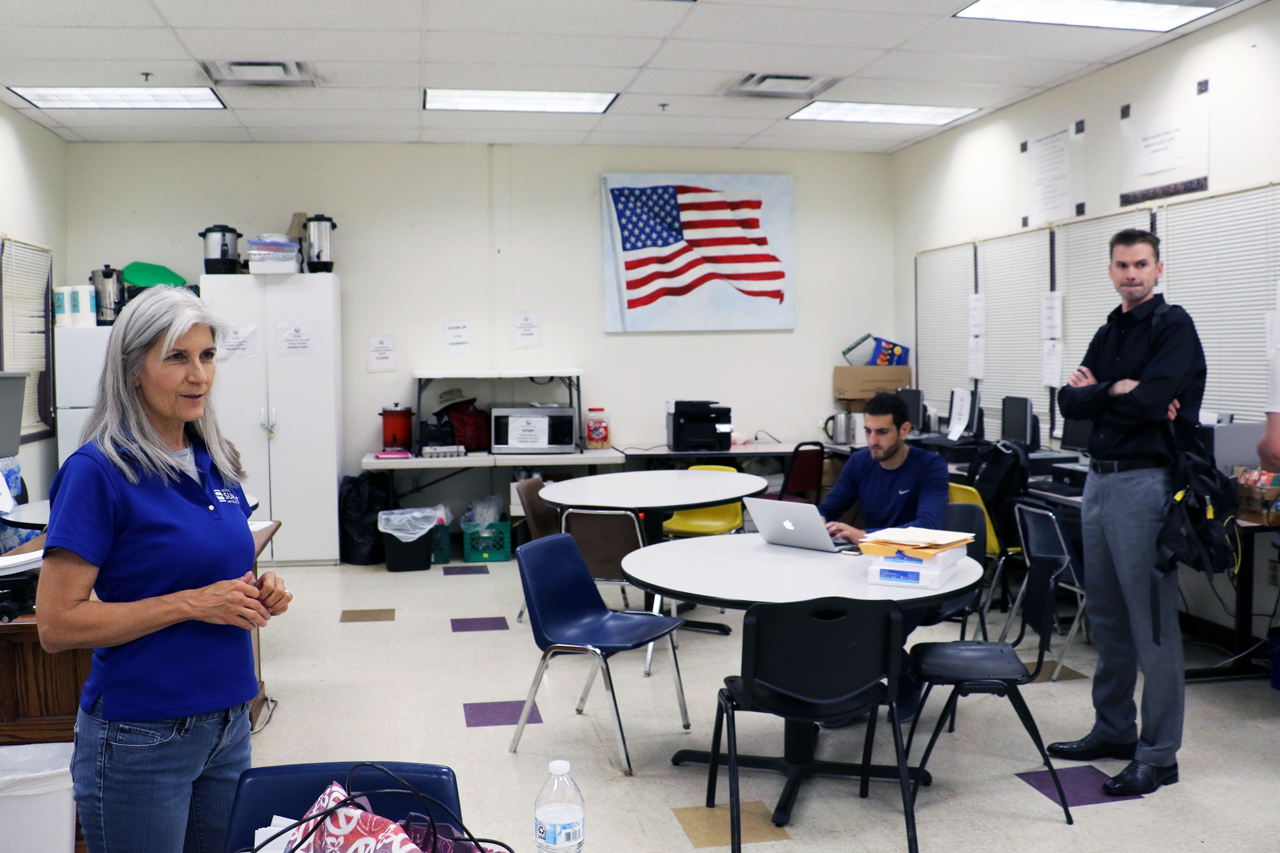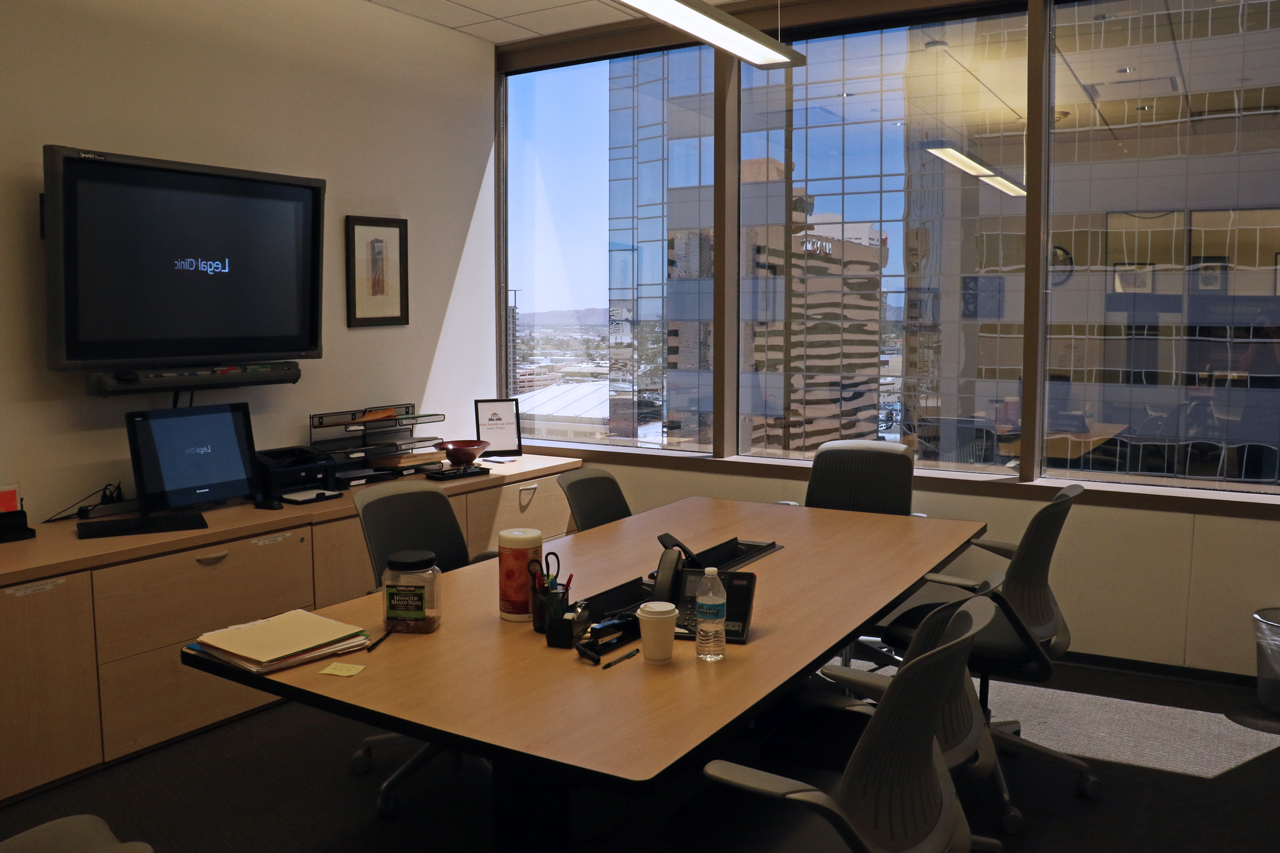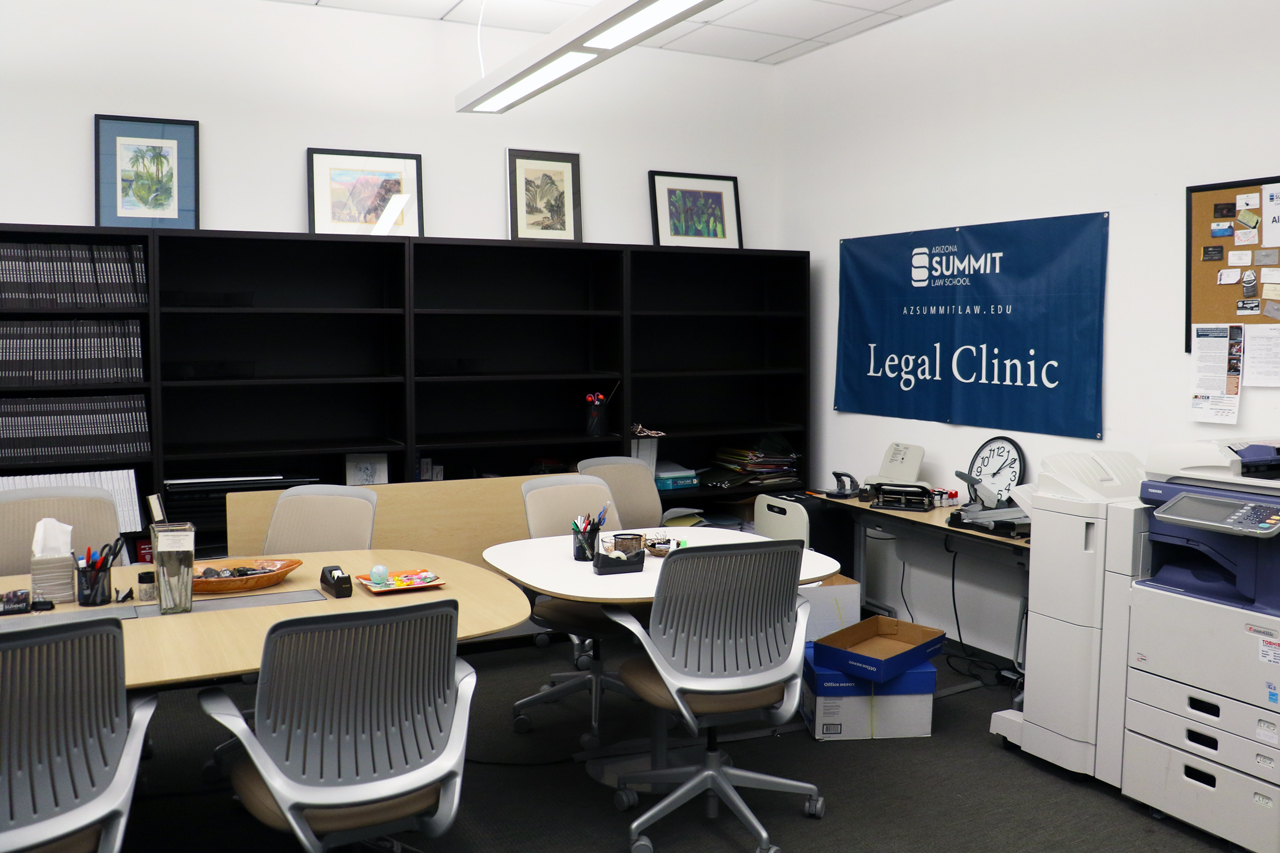- Things to do
- Eat & Drink
- Music
- Pro Sports
- Getting Around
- Shopping & Services
- Hotels
- Arts & Culture
- Tours
- What’s Happening
Browse by category

Located between the Downtown Core and Capitol Mall, the 13-acre Human Services Campus is a collaboration between many different partner organizations, all working to end homelessness in the community. (Photo: Fara Illich)
Tucked inside a bare-bones computer lab on the Human Services Campus in Downtown Phoenix, a group of Arizona Summit Law School students and a professor host a free legal clinic every Tuesday.
It’s a relaxed environment, everyone is dressed down. One student with a laptop anchors one of several small round tables, while a queue forms in the lobby/respite area of the Lodestar Day Resource Center (LDRC).
For more than two hours, there’s a steady stream of people. Every case is different but everyone who walks through the door gets the same three things: eye contact, a warm smile and respect.
“We constantly have to think on the fly — you sit down with clients, they tell you their issue, and you have to start brainstorming immediately,” said Kamal Lahlou, a 33-year-old senior law student.
For the students, they’re receiving invaluable hands-on legal experience, but for those experiencing homelessness — it’s perhaps their only chance to get out.
Many individuals face a complex entanglement of legal woes, sometimes associated with the act of being homeless like loitering or camping. Other times, it’s the reason they lost their home in the first place — a felony conviction, prison stint, domestic abuse, civil or misdemeanor fines.

From left, professor Susan Daicoff along with students Kamal Lahlou and Michael Jones get ready for the last Human Services Campus legal clinic of the spring 2018 semester. (Photo: Fara Illich)
Maricopa County Regional Homeless Court is also located on the Human Services Campus — just down the hall, in fact. It can resolve minor misdemeanors, victimless offenses, and warrants for those who demonstrate a commitment to end their homelessness.
Referrals to homeless court, clearing up records and settling fines represents a large portion of what the Summit legal clinic does. But it runs the gamut from name changes, divorces, landlord-tenant issues, probate, elder abuse and many, many others.
Under the rules of the Arizona Supreme Court, the students can actually practice law in a clinic setting as active members of the state bar, as long as they’re supervised by a licensed attorney, law professor or with other licensed attorneys.
According to the school’s records, the clinic handled 848 legal matters on the Human Services Campus over a four-year period, with one professor and about 3-5 students per semester.
More than 65 percent of graduating seniors take advantage of one of the legal clinics offered by Summit, according to professor Susan Daicoff, who leads the program and oversees the Human Services Campus clinic.
“When clients say, ‘I don’t want to see anybody else, I only want to see you guys’ — that’s a great feeling,” she said. “I want people to walk away feeling like we treated them well, that we treated them with respect, that we empowered them to handle their own legal matters, came alongside them, and pulled them out when they were stuck.”

Michael Jones chose Arizona Summit Law School for the legal clinic experience, getting real world experience as an attorney. (Photo: Fara Illich)
Students must complete at least 30 hours of pro bono or public service during their studies, which can be achieved through the Human Services Campus clinic, or others. There are about 10 rotating clinics focusing on domestic violence, mediation, veterans, bankruptcy, Native American wills, immigration, post-conviction relief and other issues.
Getting real world, hands-on experience was a big selling point for Michael Jones, who has participated in multiple clinics, his favorite being Arizona StandDown, which helps veterans in-need. He said it’s different than an internship or working at a firm as a file clerk.
“I get to see every aspect of the legal process,” he said. “I might not always know exactly what to do, but I always have the resources around me to problem-solve.”
Jones is 40 years old, married with a small child. So having the flexibility Summit offers is important too.
The school accepts students with lower Law School Admission Test (LSAT) scores than many other universities, and offers part-time degrees and evening classes — geared toward working adults.

Arizona Summit Law School is an urban campus with clinic and classroom space in the One North Central building of Downtown Phoenix. (Photo: Fara Illich)
It was established to diversify the least-diverse profession, and it’s making inroads in that area. The student body is 41 percent minority, compared with 26 percent at Arizona State University, and 33 percent at the University of Arizona.
“Serving the underserved” extends to the student population as well. The school accepts more students from disadvantaged economic, social or family circumstances.
“When you think of law school, you always think of the high society types,” said Stephen McClain-Lovato, a 30-year-old senior law student.
“That general attitude is stripped away at this school. You’re treated as an equal, you’re treated as a peer.”
McClain-Lovato sports a Battletoads t-shirt, long hair and a beard. “This is what I wear to school,” he said, laughing. He’s a Marine Corps veteran, and likes the humanitarian nature of the Human Services Campus clinic. He’s participated in the homelessness clinic multiple semesters, even volunteering during breaks.

There are about 10 rotating legal clinics offered by Arizona Summit Law School focusing on homelessness, domestic violence, mediation, veterans, bankruptcy, Native American wills, immigration, post-conviction relief and other issues. (Photo: Fara Illich)
Part of what makes the clinic so successful is the network of services clustered on the Human Services Campus — enabling students to work faster, more efficiently. Onsite, you can get a state ID, apply for job, submit social security or disability paperwork, find housing programs, get primary and mental healthcare, access substance abuse treatment — in addition to shelter and a hot meal.
The LDRC — where the clinic is located — is often the first stop on the road to ending homelessness.
“It’s an opportunity for individuals who are experiencing homelessness to gain access to legal counsel in an environment that is sometimes not as threatening as the justice system can be,” said Gina Brockdorff, the supportive services manager at the LDRC. “Those who seek out assistance through the clinic are able to face issues that may be the very barrier standing between them and housing.”
Some simple matters require just a few phone calls and can be resolved same-day, others take years. For issues that require court appearances or legal matters the students can’t tackle, they often leverage strong relationships they have with the local legal community.
“One of the things we learned when we first came to the Human Services Campus is: don’t give a man a fish, teach him how to fish,” Daicoff said. “Our clients are in charge of their own advocacy and we’re just helping shepherd the process, rather than fixing their problems for them.”